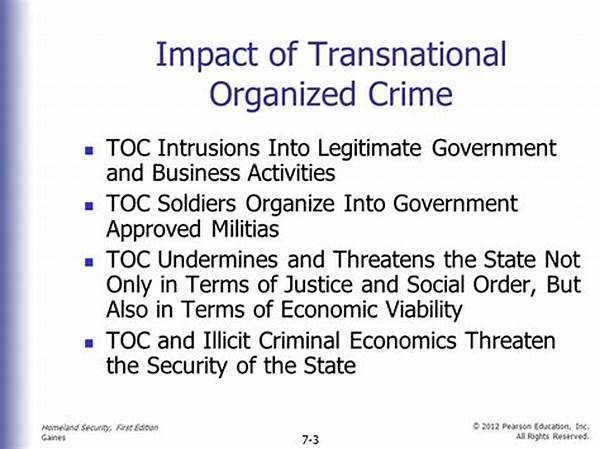Transnational organized crime activities are a significant concern for the international community. These activities can subvert economies, tarnish societal structures, and even influence global politics. The pervasive nature of these crimes exacerbates global insecurity, and understanding their dynamics is critical for formulating effective responses. Governments, law enforcement agencies, and international organizations are prioritizing the development of comprehensive strategies to counter such threats and protect communities worldwide from the adverse impacts they propagate.
Understanding Transnational Organized Crime Activities
Transnational organized crime activities encompass a wide range of illicit undertakings conducted by highly coordinated, resource-rich criminal networks. These activities transcend national borders, complicating efforts to regulate and mitigate their effects. Types of activities commonly include drug trafficking, human trafficking, arms smuggling, money laundering, and cybercrime, impacting societies both developed and developing. It is critical to acknowledge that these activities not only drain economic resources but also have severe social implications, including widespread violence, corruption, and systemic destabilization of communities. By understanding the broad impact of transnational organized crime activities, stakeholders can better coordinate international efforts to combat these crimes, ensuring enhanced security and stability across regions.
The Scope of Transnational Organized Crime Activities
Transnational organized crime activities are multi-dimensional, affecting nations across continents:
1. Drug Trafficking: A prominent facet where illicit drugs are manufactured, moved, and sold globally, significantly impacting public health and safety.
2. Human Trafficking: Involves exploiting individuals through force, fraud, or coercion, often for forced labor or commercial sex.
3. Arms Smuggling: Facilitation of illegal arms across nations, contributing to proliferation of violence and conflict.
4. Money Laundering: Process of concealing origins of illegally obtained money, integrating it into the legitimate economy.
5. Cybercrime: Exploitation of digital platforms for activities like fraud, identity theft, and financial theft, presenting modern challenges to law enforcement.
Strategies to Combat Transnational Organized Crime Activities
Addressing transnational organized crime activities requires multi-pronged strategies involving international cooperation and robust policy frameworks. Countries must engage in collaborative law enforcement operations to dismantle criminal networks effectively. Strengthening border security and utilizing technological advancements are crucial in identifying and intercepting illicit activities in their inception. International conventions, such as the United Nations Convention against Transnational Organized Crime, set a strong precedent for establishing legal frameworks that guide countries in harmonizing their laws and facilitating mutual assistance. Additionally, promoting public awareness and community engagement is essential to cultivate resilience against these crimes, empowering local populations to identify and report criminal activities. Comprehensive approaches to transnational organized crime activities can foster environments of safety and stability internationally.
Challenges in Curbing Transnational Organized Crime Activities
Despite numerous efforts, challenges persist in addressing transnational organized crime activities. Coordination among international and regional law enforcement agencies often encounters bureaucratic hurdles and jurisdictional issues. The sheer sophistication and adaptability of criminal networks make it difficult to anticipate and prevent these activities. Limited resources and technical expertise further hinder effective law enforcement and judicial proceedings. Cultural and socio-economic factors may also impede cooperation among nations, necessitating culturally sensitive and flexible strategies. Additionally, emerging technologies pose new threats and vulnerabilities that criminals exploit. Acknowledging these challenges is vital for devising innovative solutions and reinforcing global security against transnational organized crime activities.
Economic Impact of Transnational Organized Crime Activities
Transnational organized crime activities significantly burden global economies. Illicit markets and their associated criminal activities often undermine legitimate businesses, distort market prices, and lead to loss of state revenues. Money laundering activities obscure financial transparency, allowing billions of illicit dollars to circulate through economies unregulated. The resulting economic instability disproportionately affects developing countries, hampering their growth. The costs of enforcing laws against these crimes and rehabilitating affected communities divert vital resources needed for development. Understanding the economic implications of transnational organized crime activities can drive policy changes aimed at reducing their financial incentives and damaging effects on economic systems worldwide.
Social Implications of Transnational Organized Crime Activities
Beyond economic repercussions, transnational organized crime activities erode social fabric and governance. They often perpetuate violence and corruption, undermining rule of law and public trust in institutions. Vulnerable populations become victims of exploitation, leading to extensive human suffering and loss of life. Communities affected by these crimes experience degraded security, exacerbated inequalities, and stunted social development. Ensuring community resilience and strengthening the capacity of social institutions is essential in mitigating these impacts. International cooperation and engagement at grassroots levels are crucial in stemming the tide of transnational organized crime activities.
Summary of Transnational Organized Crime Activities
In summary, transnational organized crime activities present grave threats to global security, economic stability, and social cohesion. These multifaceted criminal enterprises operate across borders, exploiting systemic vulnerabilities and evading legal frameworks. The sophisticated nature of these activities necessitates comprehensive international strategies and cooperation. Effectively addressing these issues entails a blend of law enforcement, legal reform, technological advancement, and public awareness initiatives. While significant challenges persist, including technological complexities and economic incentives, coordinated global efforts can mitigate these activities’ destructive impacts. Prioritizing transnational collaboration, resource allocation, and policy innovation will ensure the protection of societies from the pervasive threats posed by transnational organized crime activities.





